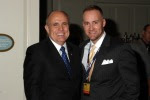We do live in two Americas, but not the two John Edwards imagined. In order not to waste your time, I’m going to dispense with any political correctness here. The future of our nation and the America our children and grandchildren will inherit is too important. We live in a country pretty clearly divided (generally speaking) by the “city-dwelling/single/childless/tax-supporting/secular/” versus the “suburban/rural/personally-responsible/married/family/religious.” None of this should be news to conservatives. These cohort trends have been clear for decades. What is news is that the former group members are showing up at the polls in large numbers and the latter are not.
We conservatives, particular the fiscally concerned, assumed the current economic status of our union would ensure a Romney win. Many of us couldn’t even comprehend the race would be close. Unemployment has been at around 8% or more for four years. Our national debt has doubled to more than $16 billion. 47 million Americans are on food stamps. Our economy is growing slower than it has since WWII. The President and Congress haven’t approved a budget in four years. The nation needed a proven leader who could fix the dire economic conditions, create new jobs, spur growth, reduce debt and improve efficiency in our federal government. We nominated one of the country’s most successful “turnaround” guys. Those of us over the age of 40 were convinced that this election was “about the economy, stupid.” On November 6th at around 10:00 pm, a lot of us, including many political experts and consultants, began to face the “new reality” of national elections in the United States.
There are more secular voters in America today who put “progressive” social issues above economic or religious values. Those issues include immigration, gay rights, global warming, free health care, college tuition assistance, abortion and the like. These voters clearly saw Romney as someone to fear because he would not give them the things they wanted. Like a child who doesn’t want Daddy to come home so the rules don’t have to be enforced, the Obama voters were motivated to keep Romney out of 1600 Pennsylvania Avenue. In my view, progressive voters are a lot like children – not wanting to, or perhaps not knowing how to, make hard decisions today about discipline for the benefit of tomorrow.
But we conservatives lost this election for other reasons, too. Barrack Obama showed us that relentless campaigning, astute social media marketing, pop culture public relations and sophisticated community organizing are all critical parts of winning elections today. The Obama campaign was simply superior in this regard. The administration has proven to be very poor at effective governing but it is truly impressive at executing political campaigns.
Obama and the liberals/progressives have successfully taken us to that tipping point whereby enough voters are hooked on the road to serfdom – exchanging their votes for goodies today that only weaken our tomorrow. The only way to beat this system is to nominate a candidate who can harness pop culture, be relevant to the youth, engage sports and media personalities, leverage social/digital media technology and who can be attractive to the young, old, urban and rural. Make no mistake; I am not suggesting a move away from conservatism in the least. What I am saying is that Ronald Reagan and Barack Obama have proven that the messenger is a critical part of the message. We have the right message. What we don’t have today is the messenger or the marketing. I don’t know who the next “voice” of the conservative movement is going to be. What I do know is that we better find an inspirational one. And, we better surround him/her with the modern marketing and communications tools necessary to win a national election in America in 2016. If we don’t, the conservative movement may end up just like vinyl musical albums – nice to listen to for nostalgia but not a lot of other citizens with the turntables required to hear the music.
Sunday, November 18, 2012
Tuesday, November 9, 2010
PATHWAY TO PROSPERITY

Ten policy issues we must pursue if we value liberty
1) Embrace, enable and defend the free enterprise system. Provide businesses with a fair and predictable regulatory environment to encourage risk-taking and competition.
2) Establish a simple tax system with a flat rate that only taxes income one time. Watch as entrepreneurs put capital to work and our federal treasury revenues grow.
3) Reduce spending at all levels of government. Address the structural issues in our entitlement programs, which are draining more and more of our government budgets. Shrink the number of employees at all levels of government. Remember, governments don’t produce; they consume.
4) Ensure our defense of liberty by making our military strong. Make our foreign policy clear and unmistakable to our enemies.
5) Recognize that America must lead in the world so that liberty, security and prosperity are secured at home.
6) Enforce the existing immigration laws. We are all from somewhere else but we are united by our common, shared ideals and language. A bedrock principle of our system is the rule of law.
7) Empower parents to makes choices for their children’s education. Encourage competition and accountability in the public education system. Return the power to the states and the local communities for education.
8) Listen to the people. America remains a republic of “We The People.” We reject a centralized, top-down approach in Washington…no matter what party is in power.
9) Pass “Term Limit” legislation. Our representative republic was not designed with the intention of creating career politicians. Elected officials should be “reluctant servants” who return to their personal careers after a robust but short term of service.
10) Encourage and respect the vital role that family and religion play in our society. These civil institutions can provide better “welfare” for individuals more efficiently than government can – or ever has.
Tuesday, October 12, 2010
PUBLIC EDUCATION, FEDERALISM & THE FREE MARKET

Protecting Our Prosperity by Embracing Competition
Our Founding Fathers believed in a civic education for our children, preparing them for the requirements of self-government. The founders thought this public education was fundamental to the future prosperity of America. They were right. Jefferson wrote that his aim for a public education system was to ensure that all children could become “worthy and able to guard the sacred deposit of the rights and liberties of their fellow citizens.” In advocating for a civic education, Noah Webster wrote that its purpose was to “promote unity and create a sense of national spirit.” Madison, perhaps most succinctly espousing the crucial purpose of public education, wrote “the diffusion of knowledge is the only guardian of true liberty.” How disappointed these men would be to see how poorly and unfaithfully we have performed our duty to safeguard liberty in the area of public education. Over the past 40 years, we’ve simply failed.
If the education of a society is determined by how well it transmits true and time-honored values from generation to generation as the former US Secretary of Education, William J. Bennett has suggested, we have some serious character flaws to address. A lot of public school testing data has shown us just how little students know about our collective past. Without an understanding of the unifying ideals of freedom and equality that unite us as Americans, how can the next generation comprehend our nation’s greatness? We, as Americans, are at our greatest when we celebrate our common (shared) principles. Peoples from all over the globe have been attracted to America because they saw a country bound together not by a common ethnicity, but by loyalty to a principle. Our founding fathers understood that the education of our children is one of our civilization’s most critical tasks. We are failing and liberty is in jeopardy as a result. We must not allow a failing system to remain insitu. We must reclaim the public institution of education. It is our civic obligation. What’s more, from a purely pragmatic perspective, successful public schools are an economic necessity. Any growing and prospering community, whether local, regional or national, requires excellent public schools.
The current K-12 system is not an American one. It has become an autocratic, anti-competitive bureaucracy of the highest order. In a country founded uniquely upon the simple yet powerful ideal of “We the People,” we must return the power of education back to the people. The current business model must change. It is the only way we can remain competitive in the world. Every liberal, every public education lobbyist, every education union leader and incumbent education apologist will claim our problem is simply a matter of funding. This is not only a ridiculous and fatigued hypothesis; it is patently false based on decades of empirical data. The scientific evidence is overwhelming. There is no correlation between spending and educational achievement. In fact, the US spends more on education than any other nation in the world. Since 1960, federal spending on education has more than tripled while our aptitude has remained constant (using standard test scores).
Perhaps our biggest failure has been allowing the public education system to become a de facto function of the federal government. Since when does education power rest with the feds? The US Constitution does not authorize the federal government to control, manage or finance education. It wasn’t until the Carter Administration that we even had a Department of Education. The current White House Administration is encouraging (actually bribing) states to adopt a national education standard. In my view, nothing could be more counter productive than states, counties, communities, teachers and parents ceding their control and responsibilities to a centralized, bureaucratic, “standardized” department in Washington, DC. By the way, what happened to federalism? How did the constitution get completely ignored while the feds usurped the states’ rights to establish standards, tests and curriculum? There has been no public debate. There has been no vote in Congress. Not only is the process an assault on our founding principle of federalism, it is destined to fail because it ignores the customer in the equation. In a free market system, the schools would answer to the parents for the quality of the product. In the present scenario, the states have to answer to the federal government - devoting time and resources to fill out federal grant applications versus providing a better education to our children.
When public education works well, and it does in many places in our country, there are some important common denominators. The best and most productive schools are a result of local people, local leadership, community commitment and parental values. These “high performance” schools are not a result of federal tutelage. What makes an effective school? According to Ron Edmonds, formerly the Director of Urban Studies at Harvard, there are seven attributes:
1) Clear School Mission
2) High Expectation for Success
3) Instructional Leadership
4) Frequent Monitoring of Student Progress
5) Student Time On-Task
6) Safe and Orderly Environment
7) Home – School Relations
So, if we really want our public schools to work well, what should we do? The answer is simple. Take a look at what works in our business economy. Centralized, top-down, multi-layered management is not the answer. High performance companies move fast, are responsive to their customers and continually improve efficiency. Successful businesses empower their employees to solve customer problems at the local level because they understand that customers are the reason the company exists. If we want to dramatically improve our public education system, we must being the forces of competition to work in the education industry. Schools and school districts need to assure local control, empower parents, invite new and different people into school management and let good old fashioned competition drive out the weak, poorly performing and/or failing schools. We need to let all schools compete for tax-payer dollars. We need to de-construct the government-run monopoly. In a free market system, those who produce goods and services are ultimately answerable to the consumer. So it must be in our education system. No one cares more about the future of a child than his/her parent. We must give parents the power to choose and teachers the power to teach.
The Bill of Rights, specifically in the Tenth Amendment, limits the powers of the federal government by ensuring that states retain all powers not specifically delegated to the feds. This protects our liberties. It ensures the most vital and personal issues remain close to home. As citizens of the republic, we have an obligation to restrict federal power and to preserve a system of “We the People.” If we want to reverse the steady slide in our public education of the past 40 years, we need to heed the words of Madison, Jefferson and Webster. We need to take responsibility for the character of our society and for our competiveness in the world. We must adopt a system of accountability to measure the results of students, teachers and principals. Parents must be given the choice to send their children to schools they know will provide the best value. Our future prosperity and our liberty are at stake…and they are inextricably linked.
Wednesday, July 7, 2010
TOP TEN THINGS ABOUT BEING A SOUTHERN GENTLEMAN



Of all the things I’ve written about, this one is likely to generate the most discussion and disagreement. So, here are my ten most favorite things about being born and bred in the South:
1) College Football is a recognized form of religion. (see
www.southernfriedfootball.com)
2) Golf can, and should, be played in every month. (see www.masters.com)
3) All of our Grandmamas can cook. (see www.southernliving.com)
4) We haven’t forgotten how to dress. (see www.southernproper.com)
5) G.R.I.T.S (Girls Raised In The South). (need I say more?)
6) Our slowness of speech is a result of our fullness of thought. (see
www.twainquotes.com) As my daddy is fond of saying, “Son, make sure your
brain is engaged before you put your mouth in gear.”
7) Sweet tea with freshly cut lemons.
8) The “War Between the States” (there was nothing Civil about it) was really a war between a centralized government and the rights of states…and it continues.
9) Fresh tomato sandwiches (from your garden) are like manna from Heaven.
10) Pickup Trucks, Dogs and Shotguns go together like a glass, sweet tea and ice…it’s just natural. (see www.browning.com)
Friday, July 2, 2010
Unsustainable, Un-nerving and Un-American…a book review

America is under attack. But, I’m not speaking of the Islamists and other external forces who want to see an end to our western ways and capitalist system. We’re under attack from within and the means and methods of the war will surprise you…maybe even infuriate you.
Jim MacDougald has just written a terrific book for anyone who wants to fully comprehend the massive “bait and switch” the public sector has been pulling on the private sector over the past decade. While we (private sector employees and employers) worked harder and longer, paid more in taxes and saw our retirement savings funds whittled, the public sector employees (federal, state & municipal) saw increases in salaries, medical benefits, retirement program and pension plans. Is it any wonder that during the past decade the private sector lost three million jobs while the public sector increased its employees by two million? It all sounds lovely. The government created lots of steady jobs with outstanding benefits. What’s to complain about? Well, the complaint is that this massive shift of jobs from the private sector to the public sector is simply not sustainable. Aptly, the name of MacDougald’s immensely eye-opening book is, "Unsustainable."
In the book, the author provides massive detail, thanks to a team of researchers who has been collecting and analyzing this pay disparity data for a couple of years. I warn you, some of the public pay shenanigans, especially the “triple dipping” and “end of career spiking,” will get your blood pressure up. Whatever you do, don’t read this book after reviewing your latest retirement savings statements. At the crux of MacDougald’s thesis is simple mathematics. If the public sector keeps taking more from the taxpayers and small& medium businesses that make up the majority of our economy and uses it it pay itself total compensation (salary, pension, medical, vacation, etc.) at significantly higher rates than the private sector can afford, we will eventually crater our economy under the weight of an unsustainable economic system. The public sector doesn’t produce any revenues itself. It is reliant on the revenues derived from taxpayers and businesses. By adding more employees with greater pay, benefits and guaranteed pension plans, the public sector is adding unfunded liabilities to its future budgets. Because these liabilities are not required to be recorded as long-term debts on the Balance Sheets of our public entities, the massive obligations are hidden from us. Rather than tell us that a state’s budget is woefully inadequate because of the growing unfunded liabilities of out sized pension obligations, governors will trot out the school children and tell us that if we don’t pony up more taxes, then Johnny and Jennifer will suffer a lack of funding for adequate education. Journalists snap the pictures, capture the video and publish the sad stories and the extortion cycle works again.
MacDougald, who is the son of an Army Sergeant, created a highly successful business in the 80’s and 90’s, with thousands of employees. He doesn’t think he could replicate that success again in the present environment. He wrote this book because he felt compelled to share the information with as many people as possible in the hope of educating people and motivating them to take action. It’s the same reason he founded The Free Enterprise Nation, for which he serves as Chairman & CEO. www.thefreeenterprisenation.org
Read the book. See the facts about how government forces unionization. Learn how egregious the tactics are for making sure “civil servants” receive pension plans and lump sum payouts that you can’t get in the private sector. See how seniority trumps performance in our public education system. Arm yourself with the data so you and your family are not fooled again by the budget crisis extortion game. It’s a powerful, well-written book with lots of fresh data, but it is written in a very clear and non-technical manner. MacDougald is not an economist, (though he probably could be and his son is one) so the style and voice he employs is direct and easy to understand. It’s the author’s first book. I hope it’s not his last.
Wednesday, June 23, 2010
Debt, Valuations and the Death Spiral of Unsustainable Wage Growth in English Soccer

It is currently very fashionable for fans and media to question the sustainability of debt at certain high profile football (soccer) clubs in England. In fact, it is practically a sport unto itself at Manchester United, one of a handful of clubs owned by Americans. While it is always wise to use debt with an abundance of caution, the drama at ManU has frankly far exceeded the data. Personally, I think the hysteria is fueled as much about Yanks owning the English sport as it is about debt to equity ratios.
If one examines the situation at ManU purely from the perspective of the metrics and not as an impassioned fan or patriotic protector of the beautiful game, it is clear that the club is far from distressed. Since acquiring the club in 2005, the Glazers have grown the revenues, profits and valuation at an annual rate that outpaces the rate of interest on the debt. This acts to de-lever the club from a debt perspective. While the amount of debt is large (roughly $950 million), it is approximately half of the value of the club, which Forbes put at $1.83 billion earlier this year. The club has annual revenue of $460 million and profits of $150 million. A 33% profit margin is something every sports team owner would celebrate. This makes ManU the world’s most valuable and most profitable sports team. On top of those astonishing numbers, the team continues to win (three consecutive league titles) while making prudent, long-term decisions about its player development and wage bill. In our view, the Glazer management team has done an excellent job of growing the business and has proven it has the correct business model to manage its current debt levels. If you take a purely financial view, the fans of Manchester United should be quite happy about the current and future health of their club. And if the owners were English, they would be…at least for a while.
Now, let me tell you where there is real danger in English football. If you want to see where owners, boards and management are doing a poor job and jeopardizing the health of football clubs, look no further than the Coca-Cola Championship League. In the false belief that wage bill alone determines wins, too many clubs are spending their hard-earned money on players in an undisciplined manner. With pressure from fans and the desire to get a piece of the ever-growing media rights share from the EPL, clubs are spending beyond their means. If you examine the wage to revenue ratio of the last three seasons, you’ll see an alarming trend. The wage bill average has gone up as a percentage each year from 72% to 79% to 87%. Because media rights have far out-paced other revenue streams (attendance for example), there is an even stronger pull for Championship clubs to use debt to fund operations as a high risk gamble to buy their way into the EPL. The theory goes that once promotion to the EPL is gained, debts will be paid and all will be well. It’s a sucker’s bet. Deloitte’s Sports Business Group has issued a warning about the rising wage bills. We think it should not be ignored. If you study the past 15 years of English football, you’ll see that the path to insolvency is well worn. If you look at the NFL and the NBA today, you’ll see that the ability of management to control its single largest operational cost (wages/benefits), in the context of unprecedented economic weakness, is at the core of CBA negotiations and may jeopardize a 2011 season for both sports. http://www.forbes.com/business/sportsmoney/
So, what’s the point here? Our view is that English football clubs can actually gain from owners who are driven by the profit motive. The profit motive aligns shareholders, management and fans in regards to building a strong, healthy valuable organization. There are lots of opportunities today to find distressed football clubs at great values, but the key is management. The value of the clubs is in the ability of management to repair the broken balance sheets, improve the income statements, provide financial discipline and operate the organizations with a view towards long-term, sustainable success.
Subscribe to:
Posts (Atom)








